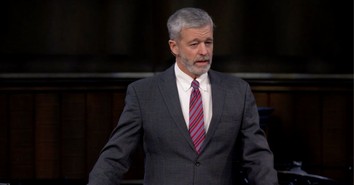What Columbus Day Reveals about America’s Complicated Founding

Tell me if you’ve heard this one:
Once upon a time, there was a nation founded by Christians, established on Christian principles and ideals, in order to be a Christian nation. A city upon a hill. A new Jerusalem.
And God smiled on this nation.
And placed His hand of providence on her. He led her and helped her grow. Soon, she became the greatest nation on the planet and took stands against moral evil and political tyrants. She came to the rescue of other nations and fought against the spread of godless ideologies.
No?
Then maybe you’ve heard this one:
Once upon a time, there was a nation founded on the values and principles of the French Revolution. It was atheistic, deistic at best, which means that God may have created things, but then He wound it all up like a ball and turned it loose in the universe and was no longer involved.
These deists, drawing from French Revolution values that were extremely anti-Christian, established a constitution and set of laws, and founded a nation on these secular principles. They purposely created this high wall between church and state to keep the church out of the state—not to keep the state out of the church. And because this nation was founded on secular principles it should be kept on secular principles.
Two stories; one country. And obviously, I’m talking about the United States.
We like the first of those two stories best.
The idea of “chosenness” and “special blessing” from God has been a constant theme throughout the history of the United States, beginning with the Puritans and their desire that, in the words of John Winthrop in 1630, “wee shall be as a Citty upon a Hill.”
As historian Conrad Cherry writes:
Throughout their history Americans have been possessed by an acute sense of divine election. They have fancied themselves a New Israel, a people chosen for the awesome responsibility of serving as a light to the nations.... It has long been... the essence of America’s motivating mythology.
But regardless of how you may feel about this culturally or biblically, is this true historically?
We celebrated our bicentennial in 1976. During that celebration, much was made of the faith and piety of the Puritans and the Pilgrims who helped found our nation and the righteous fight against tyranny fleshed out in the American Revolution.
As leading historians Mark Noll, George Marsden and Nathan Hatch noted, the idea was that everything about our nation flowed from the Christian actions of Christian people. Then those actions bequeathed Christian values and a Christian heritage. But even as devout Christians themselves, they concluded that this view of history was revisionist at best.
So which history of America is true?
Were we founded as a Christian nation or as a secular society?
Well, actually, neither.
The history of early America does not deserve to be considered as being uniquely, distinctly or even predominately Christian. Not if you mean a state of society reflecting the ideas presented in Scripture. This doesn’t mean Christian values were absent from American history. There has been a great deal of commendable Christian belief, practice and influence in the history of the United States and the colonies that formed our country.
Christian goals and aspirations were part of the settlement of North America; Christian factors contributed to the struggle for national independence; Christian principles played a role in the founding documents of the United States.
This is indisputable.
But the larger truth was that we were a religious country, but not necessarily a uniquely Christian one. And even when our forefathers and foremothers were attempting to flesh out Christian principles, they weren’t always very consistent.
For example, when you think of the Puritans of the 1600s, do you focus on their desire to establish Christian colonies and live by Scripture, or do you focus on the stealing of Native American lands and their habit of displacing and even murdering those Native Americans when it was convenient?
This is the conundrum of Columbus Day, alternatively celebrated as Indigenous Peoples’ Day. It is a federal holiday in the United States, officially celebrating the anniversary of Christopher Columbus’ arrival in the Americas. Even the names of his three ships have become ingrained in our psyche: the Niña, the Pinta, and the Santa María. And, of course, every American schoolchild used to be able to recite, “In 1492, Columbus sailed the ocean blue.”
Erroneously or not, the United States celebrates this as “The Discovery of America.” What isn’t debated is that it was the arrival of Columbus and his crew that initiated the colonization of the Americas by Spain, quickly followed by other European powers, as well as the transfer of plants, animals, culture, human populations, and technology.
And the beginning of the displacement of American Indians. Columbus-era documents have clearly shown that Columbus himself, while a brilliant mariner, exploited and enslaved the indigenous population.
As a result, though a federal holiday, many states do not recognize it and have replaced it with celebrations of Indigenous Peoples’ Day. The movement toward replacing Columbus Day with Indigenous Peoples’ Day began in 1992 in Berkeley, California. Many cities have since followed suit. Others, such as Columbus, Ohio, have chosen to honor veterans instead of Christopher Columbus. The main reason for the opposition is the recognition of the suffering inflicted on American Indians with westward expansion. Others oppose it as anti-immigrant nativists who associate it with the immigrants from the Catholic countries of Ireland and Italy.
On this Columbus Day, most Americans will not think about Columbus, the supposed discovery of America, much less the exploitation of indigenous people groups. They will not wrestle with which “story” of America’s founding is most accurate. They will simply embrace a day off from work, perhaps attend a parade that celebrates American-Italian heritage, or simply get away for a three-day weekend.
But perhaps, just perhaps, there is a bit more to think about than what to put on the grill.
James Emery White
Sources
John Winthrop, A Modell of Christian Charity (1630), in Conrad Cherry, God’s New Israel: Religious Interpretations of American Destiny.
Mark A. Noll, Nathan O. Hatch and George M. Marsden, The Search for Christian America, Expanded Edition.
For more on the history of Columbus Day, click here.
Photo Courtesy: ©Wikimedia Common/ L. Prang & Co., Boston
Published Date: October 14, 2024
James Emery White is the founding and senior pastor of Mecklenburg Community Church in Charlotte, NC, and a former professor of theology and culture at Gordon-Conwell Theological Seminary, where he also served as their fourth president. His latest book, Hybrid Church: Rethinking the Church for a Post-Christian Digital Age, is now available on Amazon or from your favorite bookseller. To enjoy a free subscription to the Church & Culture blog, visit churchandculture.org where you can view past blogs in our archive, read the latest church and culture news from around the world, and listen to the Church & Culture Podcast. Follow Dr. White on X, Facebook, and Instagram at @JamesEmeryWhite.
Originally published October 14, 2024.





